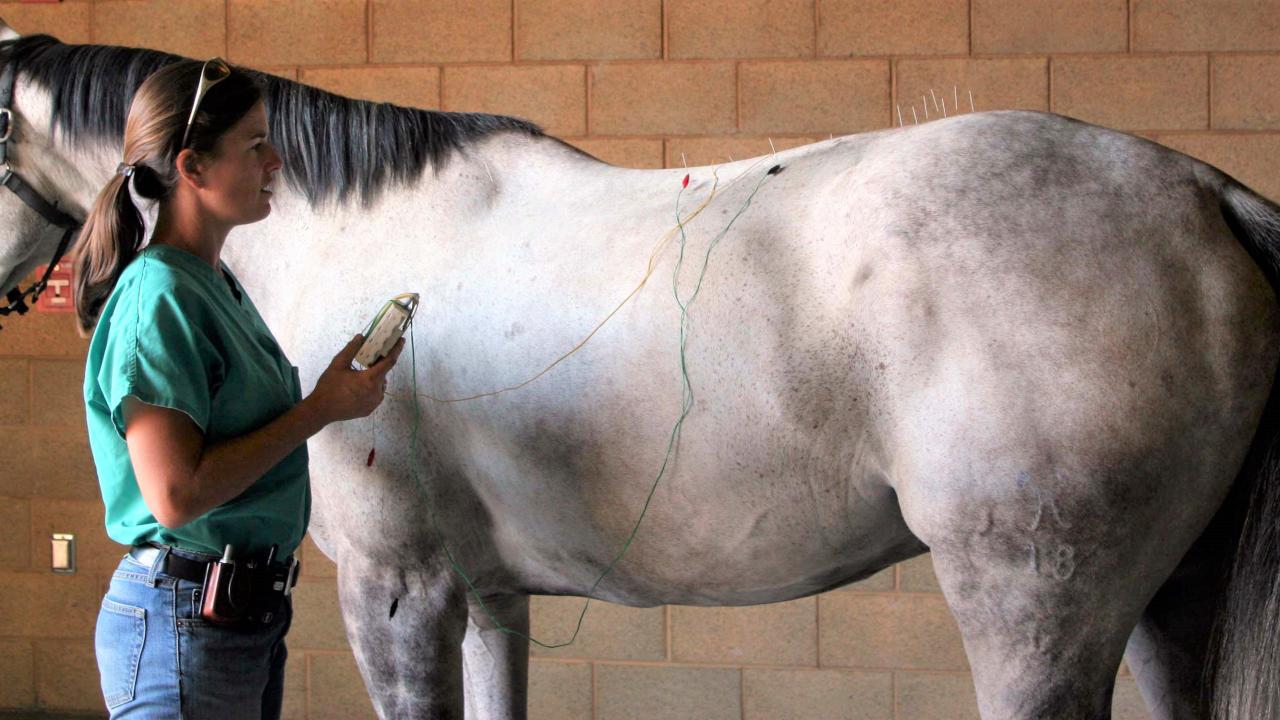
Acupuncture has been used to treat various medical conditions in humans and animals for more than 3,000 years. Horses were among the first animals treated with acupuncture due to their importance in warfare and farming. Today, equine acupuncture is commonly incorporated in the treatment of a number of conditions, especially musculoskeletal disorders and back pain.
The ancient Chinese discovered and described hundreds of acupuncture points (acupoints) in humans and animals. Modern research shows that acupoints are located in areas with a high density of free nerve endings, mast cells, small arterioles and lymphatic vessels. Stimulation at acupoints induces the release of beta-endorphins, serotonin and other neurotransmitters and can produce local, remote, and/or systemic effects. The use of acupuncture for pain relief is well supported by modern research studies. The effects of acupuncture on internal organs and on “balancing” the body as a whole are less understood, and more research is necessary to fully explain this ancient therapy.
The benefits of acupuncture have been widely recognized and integrated into Western veterinary and human medical practices. In November 1997, the National Institutes of Health (NIH) convened a panel of scientists to review the effectiveness of acupuncture. The result was the first formal endorsement of acupuncture by the NIH, stating: “There is sufficient evidence of acupuncture’s value to expand its use into conventional medicine and to encourage further studies of its physiology and clinical value.”
Acupuncture is a sought after treatment by horse owners due to its demonstrated safety and minimal unwanted side effects. It is well tolerated by most horses and provides a drug-free approach to address musculoskeletal pain that can enhance equine performance. This is particularly attractive for competitors who must adhere to show association-mandated prohibited substance policies. Aside from the needles, acupuncture does not require any specialized equipment, making it easier to perform in a variety of environments than some traditional methods.
Acupuncture can be used for a wide variety of issues.
Acupuncture can be extremely useful for pain. Besides pain relief, acupuncture may also have an impact on inflammation, which is ideal for horses with acute injuries and arthritis. It's thought that, by helping to return the nervous system to homeostasis, acupuncture may also help with the immune system and many other organ systems.
Your horse may also benefit from acupuncture's ability to increase microcirculation. This refers to the circulation of blood through your horse's smallest blood vessels -- the venules, metarterioles, terminal arterioles, and capillaries. They're located throughout your horse's body including in his or her organ tissue and stimulation of increased circulation can lead to improved wound healing, improvements in laminitis, and other great benefits.
Acupuncture for horses is a therapeutic technique that involves inserting fine needles into specific points on a horse's body to treat a variety of conditions:
- Pain relief: Acupuncture can help reduce pain and inflammation.
- Improved function: Acupuncture can help restore function to the body.
- Muscle relaxation: Acupuncture can help relax or stimulate muscles.
- Decreased swelling: Acupuncture can help decrease swelling.
- Organ function: Acupuncture can help affect organ function.
Acupuncture is a safe procedure when performed by a qualified veterinarian. It's often used in conjunction with other conventional veterinary treatments.
Here are some things to know about acupuncture for horses:
- Acupoints
There are 173 acupuncture points in animals, and each meridian has multiple acupoints. - De-Qi
When a needle is inserted, the patient experiences a sensation called "De-Qi" that indicates an acupoint has been stimulated. - Treatment plan
The number, size, and length of needles used is determined by observing the De-Qi reaction. - Treatment time
Some results can be seen immediately, but others may require several treatments. - Combination therapy
Acupuncture can be combined with medications such as local anesthetics or anti-inflammatories.
Photo Credit Photo Credit UC Davis Veterinary Medicine.
Acupuncture - General Information- Acupuncture - Education
- Acupuncture - Providers
Our Mission — Serving the professional horse person, amateur owners, occasional enthusiasts and sporting interests alike, the goal is to serve all disciplines – which often act independently yet have common needs and values.
Equine Info Exchange is totally comprehensive, supplying visitors with a world wide view and repository of information for every aspect related to horses. EIE provides the ability to search breeds, riding disciplines, horse sports, health, vacations, art, lifestyles…and so much more.
EIE strives to achieve as a source for content and education, as well as a transparent venue to share thoughts, ideas, and solutions. This responsibility also includes horse welfare, rescue and retirement, addressing the needs and concerns of all horse lovers around the world. We are proud to be a woman-owned business.

































